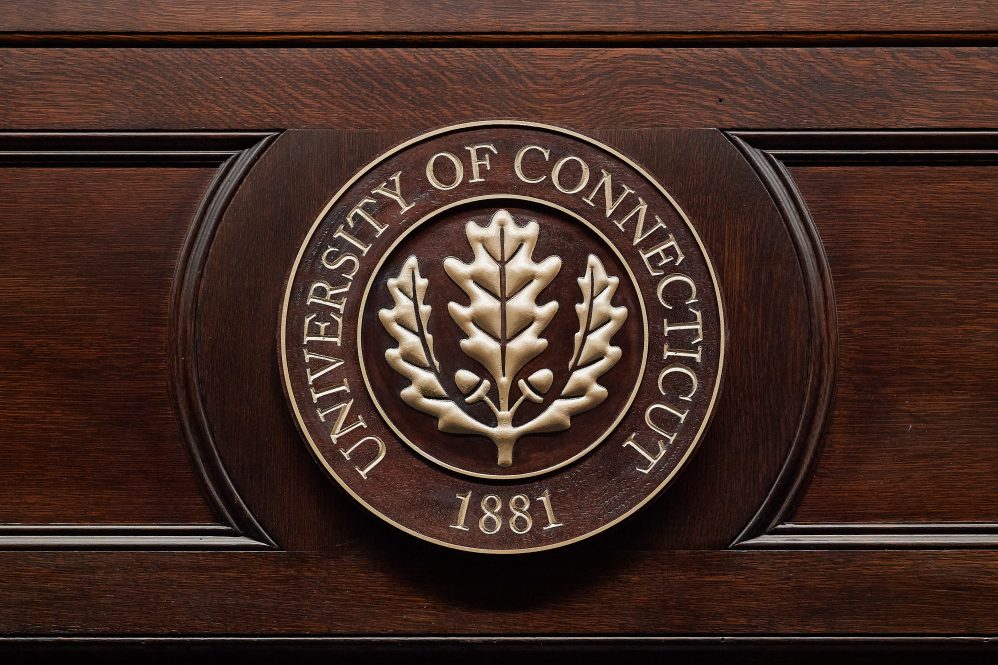The University of Connecticut has selected five of its most renowned scholars to honor with its most prestigious faculty title, the Board of Trustees Distinguished Professor.
Each year, the Office of the Provost seeks nominations from across UConn for the newest cohort of Board of Trustees Distinguished Professors. Candidates must excel in all three areas of research, teaching, and public engagement. A committee of faculty is charged by the Provost’s Office to review and select each year’s honorees from among a competitive pool of nominees.
Honorees retain the title of Board of Trustees Distinguished Professor throughout their career at UConn and also receive a $2,500 one-year stipend to be used by each recipient to further their professional activities. The number of available professorships each year is determined by the University by-laws. The Board of Trustees approved the latest cohort of honorees at its April 28 meeting.
The recipients for 2021-22 are as follows, with more detailed biographical information below:
- Ming-Hui Chen, Professor and Department Head of Statistics, College of Liberal Arts and Sciences
- Marja M. Hurley, Professor of Medicine and Orthopedics, UConn School of Medicine
- Leslie M. Loew, Boehringer Ingelheim Professor in Cell Sciences, UConn School of Medicine
- Radenka Maric, Vice President for Research, Innovation and Entrepreneurship, and CT Clean Energy Fund Professor of Sustainable Energy in the Departments of Chemical and Biomolecular Engineering and Materials Science and Engineering
- Richard Ashby Wilson, Associate Dean for Faculty Development and Intellectual Life in the School of Law, Gladstein Distinguished Chair of Human Rights, and Professor of Law and Anthropology
“The contributions of these scholars is truly astounding. They have each made significant marks in their fields, and have elevated the profile of UConn on national and global stages. They have also each played a critical part in UConn’s role as an engine for the State of Connecticut through their innovations, business and community partnerships, and their mentorship of students. I am so pleased to recognize these faculty with the Board of Trustees Distinguished Professorship. They represent the best of UConn,” said Carl Lejuez, provost at UConn.
Ming-Hui Chen
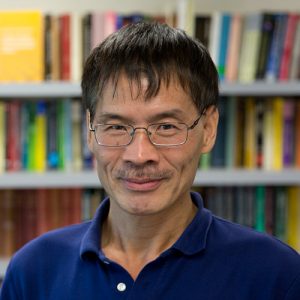
Ming-Hui Chen is Professor and Head of Statistics at UConn. His previous awards include International Chinese Statistical Association (ICSA) Outstanding Service Award in 2011, the UConn AAUP Research Excellence Award in 2013, the UConn College of Liberal Arts and Sciences (CLAS) Excellence in Research Award in the Physical Sciences Division in 2013, the UConn Alumni Association’s University Award for Faculty Excellence in Research and Creativity (Sciences) in 2014, and ICSA Distinguished Achievement Award in 2020. He was elected as a member of the International Statistical Institute in 1999, a Fellow of the American Statistical Association (ASA) in 2005, a Fellow of the Institute of Mathematical Statistics in 2007, and a Fellow of the International Society for Bayesian Analysis (ISBA) in 2016.
Chen is a world-renowned expert in Bayesian statistics, cancer research, design of clinical trials, meta-analysis, missing data, and Monte Carlo methods. Chen has published over 415 peer-reviewed articles and delivered more than 209 colloquia or invited talks nationally and internationally. He has also published five books including two advanced graduate-level books on Bayesian survival analysis and Monte Carlo methods. The statistical methods and computational algorithms developed by him and his collaborators have been implemented in statistical software SAS and R and also cited in FDA guidance. His research in prostate cancer with Anthony V. D’Amico of the Harvard Medical School has changed clinical practice in the United States and abroad with regard to the management of prostate cancer and complications from its treatment. His work is supported by grants from the NIH, the NSF, and several industrial companies.
At UConn, Chen has been a member of the Research Advisory Council (2013-2014) and University Senate (2018-2021), and was the Director of Statistical Consulting Services (SCS) for over 10 years (2006 – spring 2019). He has supervised 37 Ph.D. students and trained over 100 graduate students on statistical consulting and collaborative research. Chen initiated and organized the annual UConn Statistics Biopharmaceutical Summer Academy started in 2018. Now, this summer academy has been integrated into the MS program in Biostatistics as a required 1-credit course BIST 5092 Biostatistics Practicum.
His service to his profession has included Executive Director of ICSA (2017-2010), President of ICSA (2013), Chair of Eastern Asia Chapter of ISBA (2018-2019), President of New England Statistical Society (2018-2020), Representative from Districts 1-3, ASA Caucus of Academic Representatives (2018-2021), and the 2022 JSM Program Chair. He is a member of grant review panels for federal agencies and an organizer of several international conferences. Currently, he is Co Editor-in-Chief of Statistics and Its Interface, inaugurated Co Editor-in-Chief of New England Journal of Statistics in Data Science, and an associate editor for several other statistical journals.
Marja M. Hurley
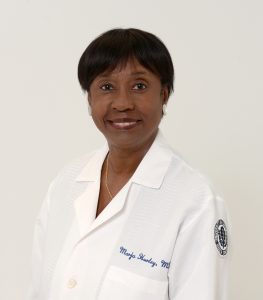
Marja M. Hurley is a tenured Professor of Medicine and Orthopedics at UConn School of Medicine. Her previous awards include the National Institutes of Health National Research Service Award (1985), first UConn Martin Luther King Award for Achievement in Science (1990), first New England Board of Higher Education Award for Innovation in Education (2003), Visiting Professor Edwin T. Harper Scholars Program, Indiana University, School of Medicine (2009),West Indian Foundation Award (2009), Connecticut Technology Council Women of Innovation and Leadership Award (2010), Ray and Carol Neag Award (2011), UConn Health White Coat Gala Honoree (2011), UConn Health Board of Directors Faculty Recognition Award (2011), Lawrence G. Raisz, Esteemed Award American Society of Bone and Mineral Research (2016), and Alumni Distinguished Faculty Award, UConn School of Medicine (2018). She was a Visiting Fellow at the Cardiovascular Research Institute, Weill Cornell Medical College, New York (2019). She is a Fellow of the American Society for Bone and Mineral Research, The Association of Osteobiology, and a member of the Connecticut Academy of Science and Engineering. She is also a Trustee of the Connecticut Science Center.
Hurley is widely recognized as a leading authority in the world on fibroblast growth factors (FGFs) in osteobiology. These growth factors are of fundamental scientific interest and are important in development and maintenance of organ systems including normal bone homeostasis as well as disorders of bone and cartilage. Her work has revealed new information about how FGF2 protects against development of osteoporosis, and osteoarthritis using FGF2 conditional knockout and transgenic murine models developed in her laboratory. She has advanced the study of these molecules world-wide. She has published over 100 scientific papers and reviews, delivered countless contributed and invited presentations before professional groups around the world, and has published numerous conference abstracts and proceedings. Her work is currently supported by grants from the NIH.
Hurley is also an accomplished teacher of medical, dental, graduate students and postdoctoral fellows pursuing biomedical research. She has supervised and mentored more than 40 students in biomedical research. She has served as thesis or associate thesis advisor for seven Ph.D., two M.D./Ph.D.., and four M.Sc. students. Hurley’s trainees have been the recipients of many academic awards including the highly coveted and prestigious American Society of Bone Mineral Research Young Investigator Award. She has coauthored a number ob publications with her trainees in major international bone and cartilage research journals.
Hurley has a long history of dedicated service at the college and university level, including two years as Interim Senior Associate Dean for Academic Affairs and Education for reaccreditation of the School of Medicine, 34 years as Associate Dean and Founding Director of the Aetna Health Professions Partnership Initiative at UConn/UConn Health, where she focused on developing STEM programs for middle, high school and college students to diversify the health professions for which she garnered more than $14 million in extramural grants. Her service to her profession has included terms as Chair for the International Gordon Research Conference (2018), Councilor of the American Society for Bone and Mineral Research (2019-2022), as a member of grant review panels for federal agencies, and as an organizer, session chair and discussion leader at several national and international conferences.
Leslie M. Loew
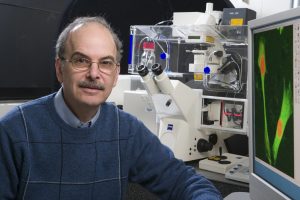
Leslie M. Loew is Professor of Cell Biology at the UConn School of Medicine. He holds a B.S. from City College of NY, a Ph.D. from Cornell and did post-doctoral research at Harvard, all in chemistry. He joined UConn in 1984 after spending 10 years on the chemistry faculty at SUNY Binghamton. He was appointed full professor in 1986 and awarded the Boehringer Ingelheim Chair in Cell Science in 2007.
While at SUNY, Loew pioneered the design and synthesis of fluorescent voltage sensitive dyes (VSDs). These dyes permit subcellular spatial resolution and millisecond time resolution, vastly improving over traditional electrode-based electrophysiology by allowing electrical activity to be imaged with high-speed cameras. Realizing this work could be best explored at a medical school, he moved to UConn, where his lab continued to synthesize improved VSDs and has applied them to imaging electrical activity in nervous and cardiac systems. He supplies VSDs to hundreds of laboratories throughout the world. He has also developed several high-resolution microscope imaging technologies that have been broadly applicable in other realms of cell and tissue physiology.
Loew is probably best known for his work in computational modeling of cell biophysics. He was motivated to pursue this area in order to begin to discern the biophysical mechanisms that underlie the wonders revealed by the microscopy experiments. With his team, he developed the Virtual Cell computational system for modeling and simulating complex biological processes. Since 1998, he has been Principal Investigator of an NIH Biomedical Technology Resource Center, which supports the Virtual Cell project. Virtual Cell has over 25,000 registered users worldwide. Loew has published one book, 237 research papers and holds nine patents. He has given invited talks at over 150 universities and scientific conferences. Between his projects on fluorescent sensors, imaging technologies, cellular biophysics and computational modeling, Loew has been awarded research grants amounting to almost $70 million during his 36-year career at UConn. Recently, with two colleagues, he founded a company, Potentiometric Probes, LLC, to help disseminate the VSD technologies.
Loew established the Richard D. Berlin Center for Cell Analysis and Modeling (CCAM) in 1994 to focus research on optical, photonic, image processing and computational technologies for the investigation of the behavior of living cells. He was the Director of CCAM from 1993 to 2020 and, with its 15 faculty scientists, built it to be a world-renowned center for multi-disciplinary cell biophysics research. In service to the UConn and the regional scientific community, CCAM established a Microscopy User Facility to offer state-of-the-art microscope imaging instrumentation and expertise. Also, CCAM assembled computational hardware and software to establish the CCAM High Performance Computing Center, which is now the largest research computing resource in the University. In education, Loew spearheaded a new Systems Biology Graduate Area of Concentration to provide unique multidisciplinary training to Biomedical Science Ph.D, students. He teaches at the graduate level in several courses and also has a long history of teaching in the Medical School basic science curriculum. Loew has been thesis advisor for 21 Ph.D. students and mentor to 33 post-docs. Additionally, he regularly mentors undergraduate interns in his lab. He organized many international courses and workshops in computational cell biology both in Farmington and at Cold Spring Harbor Laboratory. Loew has chaired and served on numerous NIH and NSF grant review panels and on editorial boards of several scientific journals. In 2012, he was selected by the Biophysical Society to serve a five-year term as Editor in Chief of Biophysical Journal. For this service and for his many other volunteer activities, he received the Distinguished Service Award of the Biophysical Society in 2018.
Radenka Maric
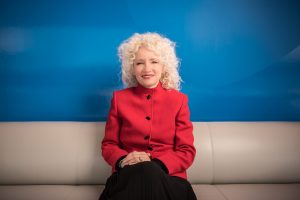
Radenka Maric is CT Clean Energy Fund Professor of Sustainable Energy in the Departments of Chemical and Biomolecular Engineering and Materials Science and Engineering. She is Vice President for Research, Innovation and Entrepreneurship (VPRIE) at UConn and UConn Health (2017-) and formerly served as the Executive Director of the UConn Technology Park and Innovation Partnership Building (2015-2017). Maric holds the rank of Fellow of the American Academy of Arts and Sciences (2019), the National Academy of Inventors (2019), and the International Association of Advanced Materials (2020), and is an elected member of the Connecticut Academy of Science and Engineering. Her many recognitions include receiving a Fulbright Chair Professor appointment at the Politecnico di Milano, Italy (2016-2017), a fellowship from the Japan Organization for the Promotion of Science (2012), the Leadership Award from the National Research Council of Canada (2009), and the Hartford Business Journal’s Women in Business Award (2020). Governor Lamont appointed her to serve on the Board of Directors of Connecticut Innovations in 2020.
Maric is a world leader in technologies for clean energy applications and sustainability. She has significantly advanced understanding of materials and catalysts and has developed innovative manufacturing processes involved in fuel cell technologies, storage materials, and electrochemical sensors for health applications, leading to higher-performance, commercially viable clean energy systems. Her scholarly work has resulted in more than 300 articles in refereed journals and conference proceedings, 21 book chapters and invited review articles in major journals, one book published, and two books under preparation. She also has six issued patents and 11 published patent disclosures. She serves on numerous review panels for the Department of Energy, the European Commission, and Horizon 2020 and serves as a board member of the International Academy of Electrochemical Energy Science.
Maric is a dedicated teacher and mentor of undergraduates, graduate students, and faculty in the areas of batteries, fuel cells, sustainability, and innovation and entrepreneurship. She initiated many programs supporting scholarship and experiential learning, including the student-led podcast called In Vivo, and World Poetry Books, the only publisher in the United States dedicated solely to publishing books of international poetry in English translation, and promoted placement of students with startup companies in UConn’s Technology Incubation Program and in UConn Health laboratories through the Partnership in Innovation and Education (PIE). She also promoted interdisciplinary collaborations and the growth of multidisciplinary research by working with deans in the Schools of Business, Engineering, and Fine Arts to support research faculty in the Human Rights Institute and other programs.
As vice president, she has focused on making research opportunities available to students and faculty across the University by supporting new funding programs, including the Innovation Grant in Science, Technology, Engineering, Arts, and Math (STEAM), the Scholarship and Collaboration in Humanities and Arts Research Program (SCHARP) Awards, and the Summer Undergraduate Research Fund (SURF) Awards, among others. She also led UConn’s task force on mental health of graduate students and has shown leadership in philanthropy by establishing an endowed scholarship with the UConn Foundation for the most vulnerable graduate students.
Richard Wilson
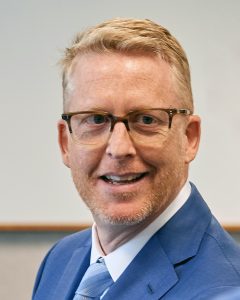
Richard Ashby Wilson is the Associate Dean for Faculty Development and Intellectual Life at the School of Law, Gladstein Distinguished Chair of Human Rights, Professor of Law and Anthropology. In 2003, he founded the interdisciplinary Human Rights Institute at UConn and served as director for 10 years, during which time the Institute hired 10 faculty, held several international conferences that led to edited volumes with Cambridge University Press, and launched an undergraduate human rights major and a graduate certificate in human rights.
Wilson is a scholar of human rights and transitional justice who teaches courses on law and society, post-conflict justice, and an interdisciplinary graduate level course on the anthropology, history, law and philosophy of human rights. He is the author or editor of 11 books on international human rights, humanitarianism, truth and reconciliation commissions and international criminal tribunals. He wrote the definitive ethnographic study of the South African Truth and Reconciliation Commission, “The Politics of Truth and Reconciliation in South Africa” (Cambridge University Press, 2001). His book “Writing History in International Criminal Trials” was selected by Choice in 2012 as an Outstanding Academic Title in the law category. His latest book, “Incitement On Trial: Prosecuting International Speech Crimes” (Cambridge University Press, 2017), explains why international criminal tribunals struggle to convict individuals for inciting speech and proposes a new model of regulating hate speech and incitement to genocide. His work has been translated into Chinese, Danish, Italian, Portuguese, Serbian, Spanish, and Turkish.
Having received his BSc. and Ph.D. from the London School of Economics and Political Science, Wilson held full-time faculty positions at the Universities of Essex and Sussex in the UK, as well as visiting professorships at the Free University-Amsterdam, University of Oslo, the New School for Social Research, and the University of Witwatersrand, South Africa. He has held prestigious fellowships from the Russell Sage Foundation, the National Endowment for the Humanities and Institute for Advanced Study, Princeton. He is committed to bringing scholarly findings into policy discussions and has consulted for various international agencies, including Conciliation Resources in the UK and UNICEF in Sierra Leone. He served as Chair of the Connecticut State Advisory Committee of the U.S. Commission on Civil Rights from 2009 to 2013, during which time the Committee focused attention on the achievement gap in Connecticut’s high schools and racial profiling in police traffic stops.
